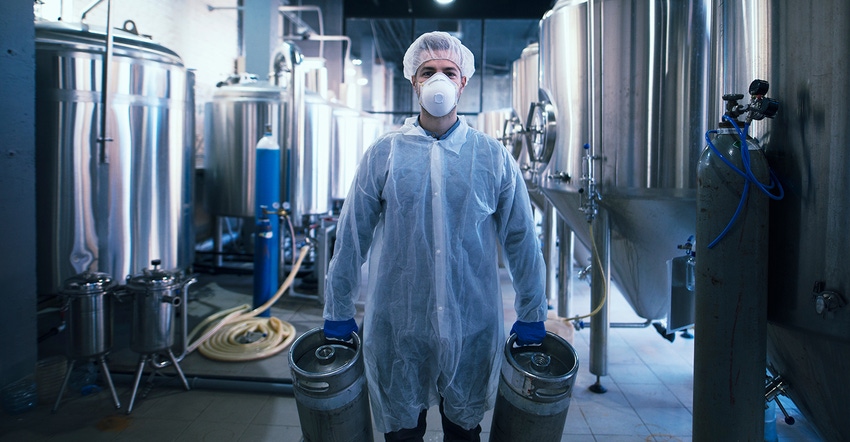While consumers scramble to fill their shelves with food and beverage products in the wake of the COVID-19 epidemic, companies in the space are confronted with new realities about whether to maintain operations, how to keep their employees safe, and how to adhere to federal advisory guidance.

The world as we know it is not, and will never be, the same. This is the stark and visible reality resulting from the escalating pandemic caused by COVID-19. Could this virus continue to develop such overcoming power as to totally disrupt the food and beverage industry? We are all in unchartered waters; therefore, it is a possibility yet to be determined.
On March 28, 2020, the federal government issued an Advisory Memorandum listing the industries that have been identified as “essential” during this time. The food and beverage industry qualified as such a group. Specifically, this article is directed at manufacturers and packagers in the industry.
Every day, supermarkets and other essential retail stores are restocking their shelves and cycling through inventory of healthy foods and beverages. Meanwhile, consumers scramble to purchase these products and stock their own home shelves with what they believe will strengthen their immune health and build up defenses against the seemingly unstoppable virus. Considering this, how should food and beverage processing firms deal with the rise in human infection and deciding whether to remain open and operational or not?
This decision will no doubt grow more challenging over time as COVID-19 news updates are delivered daily. In March 2017, The Committee for Economic Development of The Conference Board (CED), a self-described “nonprofit, nonpartisan, business-led public policy organization,” published a detailed report on the industry. They stated that over 320 million American consumers’ needs are met by the food and beverage segment of the food industry, which generates about US$164 billion a year. Given this, it is understandable that much is at stake economically in the event of a total operational shutdown due to the virus. Yet, it sparks conflict for many companies wanting to run at full operation while concurrently ensuring and prioritizing their workforce safety.
FDA has posted on its website valuable information concerning how industry and consumers should additionally approach food safety. Included in this are links to added guidance documents and other important information provided by the CDC (Centers for Disease Control and Prevention), the NIH (National Institute of Health) and OSHA (Occupational Safety & Health Administration) concerning employee safety and protection during this pandemic. Manufacturers and packagers should take focused measures to review and adhere to these directives as a basis to continue or suspend operation (if warranted). In light of this, how do you balance ensuring the care and safety of employees while meeting market demand accelerated by frantic consumer need, as all are threatened by this virus?
Here are four recommended steps to take now to help achieve this balance and effectively maintain an uninterrupted food and beverage supply.
1. Know what cGMP (current Good Manufacturing Practice) regulation(s) applies to your industry and ensure strict adherence (e.g. FSMA [Food Safety Modernization Act] requirements). Having a robust Quality Management System (QMS) with well-written Standard Operating Procedures (SOPs) and proper employee training will ensure consistent compliance with necessary facility, equipment, product manufacturing and testing requirements.
2. Review and ensure appropriate and effective personnel hygiene procedures and policies are in place. FDA has long provided regulations that specifically address this across the food industry (i.e. initially, 21 CFR 110.10; now 21 CFR 117.10 Personnel (a) Disease control; (b) Cleanliness) for both the domestic and foreign supply chains. Clearly specified in these regulations are required steps that a company must take to ensure that both persons and product are not contaminated by day-to-day handling or by contagious human illness. This would also be an appropriate time to have Human Resources review the Employee Handbook for company policy on employee illness reporting and handling. Consider updating this with current relevant health authority requirements. OSHA has also provided recommended guidance on preparing workplace environments for COVID-19.
3. Retrain employees and develop a COVID-19 Pandemic Disease Plan (PDP). Conduct a training refresher on cGMP personnel hygiene practices and incorporate present state/local public health guidance and directives on how best to avoid the spread of the disease and protect workers, customers, clients, contractors, etc. Be sure to properly document this training. Employees who advise that they have tested positive for COVID-19 should be sent home immediately and told to contact their health care provider. Subsequently, report the incident to your local or state public health department as may be required. This allows the health authorities to conduct “contact tracing” and monitor your company’s employee population. Employees are to be notified of the occurrence, but the infected employee’s name should remain confidential (Americans With Disabilities Act [“ADA”] and the EEOC [Equal Opportunity Employment]).
4. Ensure appropriate cleaning procedures for product contact surfaces and direct handling of equipment.
Review all cleaning procedures to ensure requirements are met; update if necessary. Although FDA has stated there is no current evidence of food or food packaging being associated with transmission of the virus, it is always best to err on the side of caution at this early stage. Additionally, make sure the dilution factor of approved sanitizers is correct in order to be effective (e.g. 70% Isopropyl Alcohol [IPA]) and all applicable employees are provided with proper OSHA safety training to handle and maintain this. In the case of beverage or other liquid manufacturing, product-contact equipment surfaces must be kept sanitized and dried when not in use and proper monitoring of potable water supplies/sources (or equivalent) must be conducted by appropriate Quality Unit procedures and testing.
The COVID-19 outbreak has stirred every industry, including the food and beverage industry. A “renewed normal’ is here. As such, companies and their leaders should continue to remain as calm as possible, focus on appropriate responses, and be reminded that the safety of all people is everyone’s responsibility.
Heather Fairman is a Skilled Science and Executive professional with over 30 years’ executive leadership and management experience with highly effective results in Regulatory Affairs, QA/QC environments in the Dietary Supplement, Food Supplement, Supply Chain Segment, Biologics, OTC Pharmaceutical and Cosmetic industries. She is a sought-after independent consultant, transformational thought leader, writer and certified speaker and trainer, who also serves as the key technical advisor responsible for leading the development of raw materials for the herbal supply-chain market for the SIDS DOCK Island Women Open Network (IWON), an intergovernmental organization which has all the rights and privileges of a United Nations organization comprised of 32 countries. Heather has assisted and led companies through numerous FDA audits, assisted with FDA 483 responses, averted recalls and Warning Letters, and established effective quality management systems; sustainable compliance and regulatory infrastructure; and organizational programs that have fostered and established mutually beneficial contract manufacturer partnerships. Heather can be contacted at [email protected] or on LinkedIn.
About the Author(s)
You May Also Like






